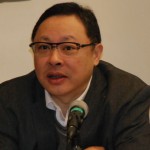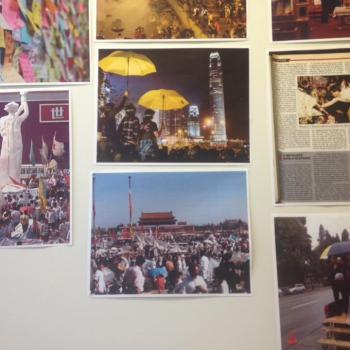![Occupy Central with Love and Peace, 14 September 2014 - by Sirlanz (Occupy_Central_Hong_Kong_Leadership_on_14_September_2014.jpg) [CC BY 4.0 (https://creativecommons.org/licenses/by-sa/4.0/deed.en)], via Wikimedia Commons](https://wp-media.patheos.com/blogs/sites/721/2014/08/Occupy_Central_Hong_Kong_Leadership_on_14_September_2014-1024x465.jpg)
While the movement doesn’t seem like it could care less about ‘Western’ support — it’s a movement for democracy through the political agency of Hong Kong people — it is certainly of public interest to those outside of Hong Kong, including everyone who don’t speak Cantonese. I’ve made my case repeatedly on this blog that Greater China geopolitics matter, so I will not reiterate that here.
That all being said, there seems to be very little news that is getting out of Hong Kong, except through HuffPost Live’s conversation with Rebecca Liao and Gordon Chang and the often-very-funny-but-very-serious blog Hong Wrong. Fortunately, as I’ve also said elsewhere on this blog, I’ve never felt that it was my duty as an academic to break the news.
In fact, in the academic spirit of the Occupy Central organizing bodies — its leader Benny Tai Yiu Ting is a law professor and a student group called Scholarism is heavily involved as well — this post is a review — not unlike one of those exam review sessions that, if you had nice professors and teaching assistants in university, you might have been privy to at one point too!
In that spirit, I am reposting a little primer that I wrote in July to make sure you all are caught up before things get to a boiling point. Here it is:
As Hong Kong returned under the sovereignty of the People’s Republic of China (PRC) in 1997 from over a hundred years of British colonial rule, the incoming government of Hong Kong worked with various civil societies to draft a constitution called Basic Law. The overall legal framework is that Hong Kong exists in a ‘one country, two systems’ arrangement with Beijing’s central government, which means that Hong Kong is a Special Administrative Region of China that makes policies that are in line with Basic Law as a legal constitution.
Most of the public controversies in Hong Kong since 1997 revolve around how Basic Law is actually put to work and whether Beijing is actually respecting Hong Kong’s autonomy under the ‘one country, two systems’ framework. Here are some examples:
- In 1999, the Court of Final Appeal case Ng Ka Ling v. Director of Immigration decided that children born of mothers not registered in Hong Kong still have the right of abode in Hong Kong as a basic human right. The ‘right of abode’ engages Article 24 of Basic Law. After the case was decided, the government of Hong Kong alleged that giving the right of abode to these kids would become a huge economic burden on Hong Kong. They sent the case up to Beijing’s National People’s Congress, where the decision was reversed. This meant two things: 1) Hong Kong’s judicial autonomy was undermined, and 2) economic conveniences trump human rights. In a related case, Filipina/o domestic workers were denied the right of abode even though they had abided by Article 24’s ‘seven year’ provision (i.e. anyone who has lived and worked in Hong Kong for seven years has the right of abode).
- In 2003, the Hong Kong Government started drafting anti-sedition legislation based on Basic Law’s Article 23. This led to a public outcry about press, speech, and religious freedoms, particularly as the legislation also had provisions to suppress various sects (implicitly, the Falun Gong). On 1 July 2003, the first 7/1 Demonstration brought a conservative estimate of 500,000 people onto the streets of Hong Kong to protest. This was the largest public protest in Hong Kong since the ‘Million Person March’ that happened on 4 June 1989 to protest Beijing’s actions in violently suppressing the student movement in Tiananmen Square.
- Basic Law’s Article 45 has a provision that states that Hong Kong will gradually transition toward democratic elections of its Chief Executive. The transition has been through an Election Committee, drawing initially 800 (later 1200) members from various sectors of civil society, to elect the Chief Executive. However, Beijing has repeatedly delayed universal suffrage in Hong Kong, first in 2005, then in 2007, and has now promised universal suffrage in 2017, but only among candidates chosen by the government without a civil nomination. In other words, there are accusations that Beijing and the Hong Kong government are both stalling and fudging Article 45. The question, in other words, is not whether Hong Kong should become a democracy, but when the constitutional guarantee that Hong Kong will be an autonomous democracy in a ‘one country, two systems’ arrangement will be realized.
These constitutional controversies bring us up to the last two years. The 2012 Chief Executive election was a political spectacle that revealed that both the sitting Chief Executive, Donald Tsang, and the two viable candidates, Henry Tang and C.Y. Leung, were all given to corruption of some sort — Tsang by associating with tycoons and triads, Tang by building an illegal structure at his home (he blamed his wife — and then it was revealed that he had had a mistress!), and Leung by being allegedly a secret Community Party member, allegedly proposing violent force to crack down on the 2003 7/1 Demonstration, and definitely also having an illegal structure in his house too (although this was discovered after the election). Despite the public unveiling of such corruption, the 1200-person Election Committee elected Leung as the Chief Executive. You can imagine how popular he has been.
Under Leung’s watch, there have been various episodes in which Beijing has been tightening its grip. The most clear one came in the summer of 2012, when a national education curriculum proposed by Beijing was decried by Hongkongers as a ‘brainwashing’ campaign. Also, with the various clarifications about the future Chief Executive candidates, the whole idea of democracy in Hong Kong is looking like it will have some serious ‘Chinese characteristics’ — and by that, one does not mean ‘cultural’ characteristics, but the unique political characteristic of everything being centrally orchestrated by Beijing.
Enter Occupy Central, or more properly, Occupy Central with Love and Peace. While pro-democratic activism has gone on for a long time and comprises many civil society groups that range the gamut from left to right, Occupy Central refocuses the key question on precisely what Basic Law means, what ‘one country, two systems’ means, and whether a democratic polity that abides by international standards per Article 45 can actually be achieved. This core question — phrased almost like an academic research question — is hardly a surprising approach given that the mastermind behind Occupy Central is University of Hong Kong constitutional law professor, Benny Tai Yiu-ting. Along with Chai Wan Baptist Church’s pastor emeritus Rev. Chu Yiuming and Chinese University sociologist Chan Kin-man, Tai has organized a series of events focused on educating the Hong Kong public as to what a ‘deliberative democracy’ looks like. Called ‘Deliberation Days’ (or in colloquy, ‘D-Days’), Occupy Central’s events attempt to bring together Hong Kong citizens to deliberate — i.e. to argue with each other and to hear each other’s different opinions — over how the Chief Executive should be elected. While the end goal is universal suffrage, Tai’s democratic public is not organized only by voting citizens, but deliberating citizens. From these deliberations, three proposals have emerged from various civil society groups as to how the elections should be conducted; all of them involve a civic nomination, i.e. instead of Beijing choosing the candidates, the candidates should be nominated by the people. These three proposals were put to vote between 22-29 June 2014 in an unofficial poll known as PopVote. The timing couldn’t have been better, as shortly before PopVote, Beijing’s State Council issued a white paper clarifying Beijing’s sovereignty over Hong Kong in the practice of ‘one country, two systems.’ In the ensuing furor, almost 800,000 votes were cast, a proposal was chosen, and the entire affair was roundly condemned by Beijing as ‘illegal’ (though Tai has said that he’s not precisely sure what exactly is ‘illegal’ about it, other than it is being called illegal). This year’s 1 July Demonstration has in turn focused on the question of Hong Kong’s autonomy, and a student group Scholarism also organized a rehearsal occupation of Chater Road, from which 511 people were arrested. This is because Tai has said that the end game of Occupy Central, should the Beijing government not heed the voice of the people, is to perform civil disobedience acts to occupy the Central district, i.e. the downtown central business district, later this year.
So that’s what we have on the table: Basic Law. One country, two systems. Political corruption. Occupy Central. All of these are constitutional questions.
NOW YOU KNOW. Keep an eye on Hong Kong, people. It matters!
















